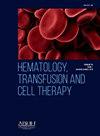INVESTIGATION OF THE RELATIONSHIP BETWEEN COMPASSION AND BURNOUT AMONG HEMATOLOGIST AND ONCOLOGIST
IF 1.6
Q3 HEMATOLOGY
引用次数: 0
Abstract
Objective
Burnout disproportionately affects hematologists and oncologists due to high-stress clinical environments, long working hours, and emotional demands of caring for critically ill patients. While compassion is integral to patient care, the relationship between compassion and burnout has not yet been sufficiently explored. This study investigates the relationship between compassion and burnout in hematologists and oncologists, contextualizing findings within using multivariate linear regression and Pearson's correlation analyses.
Methodology
A cross-sectional survey of 161 hematologists and oncologists was conducted using validated instruments: the Maslach Burnout Inventory (MBI) to assess burnout (burnout, depersonalization, personal achievement) and the Compassion Scale to measure compassion subdomains (kindness, indifference, common humanity, mindfulness, separation, disengagement). Participants were stratified by practice setting (academic vs. community), gender, and clinical focus.
Results
While the scores from the Burnout subscale and Depersonalization did not statistically predict the scores of the Compassion Scale (p > 0.05) the scores from the Personal Achievement statistically predicted the scores of the Compassion Scale (β = -0.352; p < 0.05). Pearson’s correlation analysis revealed statistically significant relationships between the Burnout scores, and Kindness, Common Humanity, Mindfulness, and Disengagement of the Compassion Scale (p < 0.05) but not with the Indifference or Separation (p > 0.05). A statistically significant relationships was only found between the Depersonalization scores and the Indifference (p < 0.05) but not the other components of the Compassion Scale (p > 0.05). While strong and positive correlations were found between the Personal Achievement scores and the Kindness and Common Humanity of the Compassion Scale, no significant relationships were observed with Disengagement, Mindfulness, Indifference, or Separation (p > 0.05).
Conclusion
The compassion was not completely corelated with Burnout, but some subscales of Burnout were corelated with some subscales of the Compassion such as personal achievement increases, the levels of kindness, common humanity, and mindfulness also increases. Individuals with higher burnout levels exhibit increased indifference and as indifference increases, the relationship with kindness alsso strengthens.
血液科和肿瘤科医生同情心与职业倦怠关系的调查研究
由于临床环境压力大、工作时间长以及护理危重病人的情感需求,血液科医生和肿瘤科医生的职业倦怠比例过高。虽然同情心是病人护理不可或缺的一部分,但同情心和倦怠之间的关系尚未得到充分的探讨。本研究调查了血液科医生和肿瘤科医生的同情心和职业倦怠之间的关系,并利用多元线性回归和Pearson相关分析对研究结果进行了背景分析。方法对161名血液科医生和肿瘤科医生进行了横断面调查,使用了经过验证的工具:马斯拉赫职业倦怠量表(MBI)评估职业倦怠(职业倦怠、人格解体、个人成就)和同情量表(Compassion Scale)衡量同情的子领域(善良、冷漠、共同人性、正念、分离、分离)。参与者按实践环境(学术与社区)、性别和临床重点进行分层。结果倦怠子量表和人格解体对同情量表的得分无显著预测作用(p >;0.05)个人成就的得分对同情心量表的得分有统计学预测作用(β = -0.352;p & lt;0.05)。Pearson相关分析显示,倦怠得分与同情心量表中的善良、共同人性、正念和脱离投入之间存在统计学上显著的关系(p <;0.05),但与差异或分离无关(p >;0.05)。只有去人格化得分和冷漠之间存在统计学上显著的关系(p <;p > 0.05),但其他成分没有差异(p >;0.05)。虽然个人成就得分与同情量表中的善良和共同人性之间存在强烈的正相关,但与脱离投入、正念、冷漠或分离之间没有显著的关系(p >;0.05)。结论同情心与倦怠不完全相关,但倦怠的部分分量表与同情心的部分分量表相关,如个人成就增加,善良水平、共同人性水平和正念水平也增加。倦怠程度越高的人表现出越冷漠,随着冷漠程度的增加,与善良的关系也会加强。
本文章由计算机程序翻译,如有差异,请以英文原文为准。
求助全文
约1分钟内获得全文
求助全文
来源期刊

Hematology, Transfusion and Cell Therapy
Multiple-
CiteScore
2.40
自引率
4.80%
发文量
1419
审稿时长
30 weeks
 求助内容:
求助内容: 应助结果提醒方式:
应助结果提醒方式:


